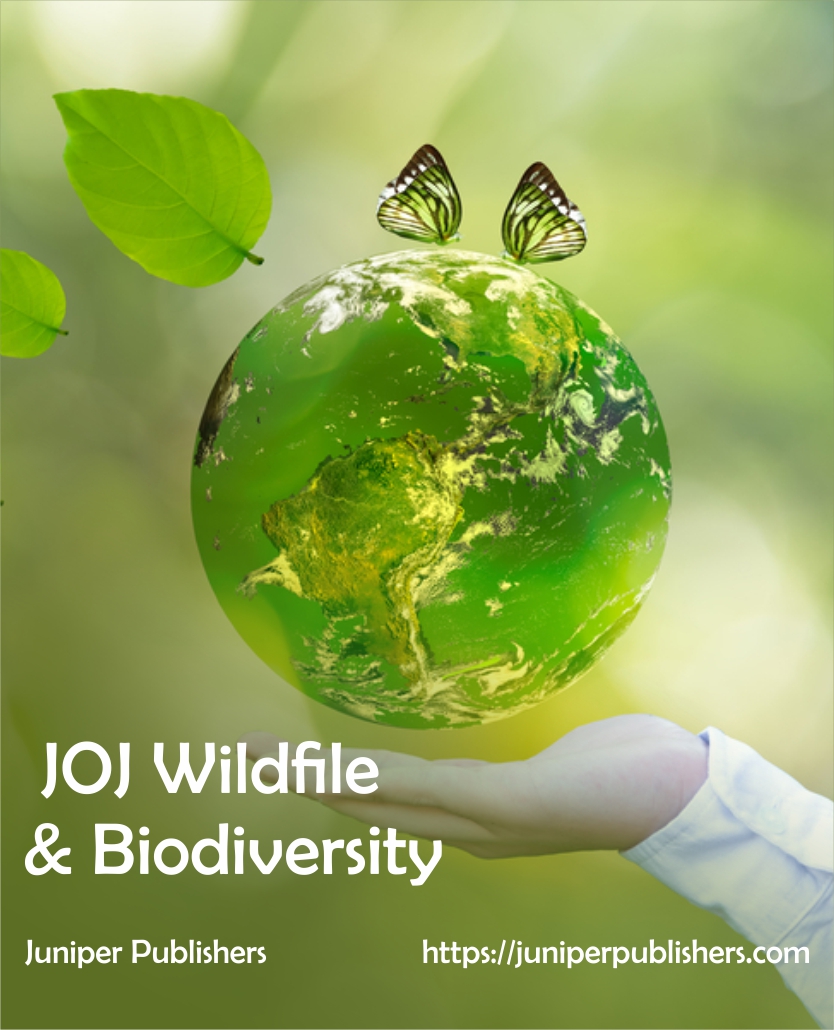An Analysis of The Components of Environment and SustainableDevelopment in Nigeria in 2008-2009 to 2018 Year
Agbebaku and Henry Usiobaifo*
Department of Environmental Science, Faculty of Sciences, National Open University of Nigeria, Jabi-Abuja, Nigeria
Submission: February 02, 2019; Published: May 31, 2019
*Corresponding author: Agbebaku Henry Usiobaifo, Department of Environmental Science, Faculty of Sciences, National Open University of Nigeria, Jabi-Abuja, Nigeria
How to cite this article: Agbebaku and Henry Usiobaifo. An Analysis of The Components of Environment and Sustainable Development in Nigeria in 2008-2009 to 2018 Year. JOJ Wildl Biodivers. 2019: 1(2): 555557. 10.19080/JOJWB.2019.01.555557
Abstract
Drawing from secondary data, the paper shows that the indices of human development index(HDI), poverty alleviation index (PAI), education index(EI) and health care index(HCI) are more essentials judging from the 13 principles of sustainable development. The study aim is to examine human perception of environment and sustainable development, to ascertain the attitude of human’s toward sustainable development and to determine the level of governance on sustainable development in Nigeria. The methodology is a combination of experimental survey on content analysis of articles from literatures on development and sustainable development. A projection of 0.03%, from 2006 population census from was considered, NBS (2016). Likewise, a projection of 0.05% index of 2018 on HDI, PAI, HCI and EI was derived from 2008-2009 calculated value. The result shows that eleven (11) states in Nigeria including Federal Capital Territory (FCT), Abuja have a higher human development index (knowledge, income and health) above the benchmark of 0.513. Five 5 states including FCT, Abuja have GDP per capita higher than the National GDP. Five 5 States have a higher GDP Index of per capitathan the National GDP Benchmark of $1,156.82. North-Central and South-East have the highest and lowest poverty index in term of geo-political zones. Ten (10) states from the northern region have higher poverty index in Nigeria. Fourteen (I4) states including FCT, Abuja have higher life expectancy index than the benchmark of 50 years while eleven (I1) states including FCT have higher education index than the benchmark of 0.712. The result shows that there is a positive correlation of population growth and development in states and geo-political zones of the indices of human development, poverty alleviation, health care and education. Lastly, resources of the environment need to be modified and conserved to attain sustainability for future generation.
Keywords: Environment, Sustainable Development, Environmental Quality, Governance, Resources and Ecosystem
Introduction
There is no doubt that the conception of sustainable development is broad in scope and nature and cut across the disciplines of environmental and social sciences. The term ‘sustainable development’ connotes an effective management of resources of the components of the environment and of the indices of environmental degradation, pollution, waste management and climate change; and others such as human governance, environmental impact of conflict, health, housing and urban development, policies and programmes, transportation and infrastructural facilities, environmental impact of project and projected impact on climate change are what the concerned of concept of environment and sustainable development [1,2]. These indices have been an abysmal threat in cities of Nigeria and Africa if compared to other places of the advanced world. The term environment serves as the totality of our immediate surroundings. It functions as the condition and circumstance affecting people’s lives. It is the complexity of physical, chemical and biotic factors upon which an organism or an ecological community and ultimately determines its form and survival [3,4]. The study of [5] states that any damage done on the environment runs down capital, which sooner or later reduces the value of its recurrent services. The implication of this is that, there is need for sustainability of the environment and its resources for future use.
There exists some level of synergy, interactions and dependency between and among the spheres of the ecosystem in order to maintain and sustain environmental balance [6]. For instance, the atmosphere depends solely on vegetative covers of the biosphere for purification and likewise the hydrosphere for precipitation. Equally, the hydrosphere depends on the atmosphere for water supply; the lithosphere depends on the atmosphere and biosphere for vegetation cover while the biosphere depends on the lithosphere for nutrients and support. The list is endless and lastly man, the fauna and flora depend squarely on all these components for life, growth, development and sustainability [7,8]. In Nigeria, the state of the natural environment has been degraded and deteriorates in recent time and is still on the decline due to the nature of man activities and his quest for comfortability [5,9]. The government as one of the ways to ameliorate this scourge has lined up series of sensitization programmes and public enlightenment campaign on the need to protect the ecosystem from further environmental degradation and threat. Every year the activities to World Environmental Day (WED) are observed on June 5th to proffer solutions to abysmal threat of the components of the environment.
Sustainable development means the capacity to improve the quality of human life while living within the carrying capacity of the supporting ecosystem [10,11]. This requires organizational change that instills sustainability values that portrays these values outwardly from all levels and reinforces them to surrounding stakeholders. The result should be a symbiotic relationship between the sustaining organization, community, and environment. Many drivers compel environmental resource management to take sustainability issues into account. Today’s economic paradigms do not protect the natural environment, yet they deepen human dependency on biodiversity and ecosystem services [9,12,13]. Furthermore, sustainable development connote the judicious use of non-renewable resources of the present and future generations, which are non-renewable resources, must be used at a judicious rate, neither too fast nor too slow and to ensure the natural wealth they represent is converted into long-term wealth as they are used [14].
According to Mishra (2008), as cited by Ivbijaro & Akintola [2] and in collaboration with the study of Cunningham and Cunningham (2015), the universal drive for the concept of sustainable development is of the menace of environmental degradation, pollution and indiscriminate dump of solid waste materials. However, the focused of the concept of sustainable development is concerned about
a. respecting and caring for community life
b. improved quality of human life
c. conserving the earth’s vitality and diversity
d. minimizing the depletion of non-renewable resources
e. changing personal attitude and practices
f. enabling communities to care for their own environment
g. keeping within the earth ‘s carrying capacity, and
h. providing a national framework for integrating development and conservation and creating a global alliance.
Sustainable development seeks to reconcile human needs and the capacity of the environment to cope with the consequences of economic and social systems and of the need to integrate the concept of environment into economic and social development which is the key sectors of human’s society, such as:
a) Economic sector; there is need for
i. growth in gross domestic product (GDP) and per capital income, and
ii. conservation of the earth, and
b) Social sector; there is need for
i. distributional equity
ii. adequate provision of social services, and
iii. governance, participation, and political accountability [2,9,15].
In view of the foregoing, the research focus is major on these indices. The study of Thomas [6], as cited by [16] shows that there must be a balance between the levels of development and stock of natural resources in the environment; that is development must be at a level that can be sustained without prejudice to natural environment and future generations. If there is to be sustainable development in Nigeria, the essentials and enabling environment need to be in place, accommodating and friendly and conserved by stakeholders of the environment (individuals, corporate organizations and government agencies). In addition, there should be improvements and sustainability of the indices of sustainable development such as, the availability of land, human-capital and material resources, good governance, sanitation, health care, education, transportation and infrastructures, housing and urban growth and development [13]. For example, in examination of the threat of solid waste as one of the drives of the indices of sustainable development; the compositions of waste materials should be made harmless to human, animal and aquatic life and to the components of the environment in general [16,17]. Global and National summits on the concept of environment and sustainable development aimed at the need for sustainable development of the earth’s resources to meet future generation [17,18]. The aftermath of the summits centered on development and conservation of the earth’s ecosystem, conservation of the environment and integrity of the environment on development of human, capital and materials resources. Surmises from these summits are...… in order to achieve sustainable development, environmental protection shall constitute an integral part of the development process and cannot be considered in isolation from it…Principle 4, Rio Declaration on Environmental and Development, 1992 [2].
In a nutshell, the concept of sustainable development is centered on improving the quality of human life and this drive is on-going and will continue to address ailing issues and problems like conflicts, poverty alleviation, human health, education, biodiversity, infrastructure, population reduction, women empowerment and gender inequality, waste management, heat wave and climate change and global warming among others environmental and global threats [2,19]. To achieve the aim of this research, the main objectives of this paper will be to ascertain human knowledge, perception and attitude (KPA) of the environment and sustainable development, while the specific objectives for the study are to:
a. examine human knowledge and perception of the environment and sustainable development,
b. ascertain the provision of essential social and economic services in some states in Nigeria,
c. determine the level of governance on sustainable development in Nigeria and
d. determine the sway of sustainable development in Nigeria.
Conceptual Analysis
The concept of environment is concerned about the totality of our surroundings. This relate to the activities of man, living and non-living creatures on the components of the environment. This includes the physical ‘natural’ and human or man-made ‘artificial’ environment. The human and man-made environment is also known as the cultural environment. Furthermore, a mixed of natural, human, man-made and cultural environment is known as the modified environment [4,16,20]. The components of the environment are atmosphere, hydrosphere, lithosphere and biosphere. These varied spheres constitute the ecological units of the environment. There exist some level of synergy, interactions and interventions between and among the components of the environment for sustainable development [19]. The study of Odiette [5], as cited by Thomas [6], and in corroboration with the studies of Cunningham & Cunningham [7] and Ivbijaro & Akintola [2], observed that the environment serves as the platform on which, the sectors of human environment (economic, social, human and agricultural) thrives and functions.
The concept of environmental quality connotes the positive value of human health, safety and environment benefits of man and others living creatures in and on the components of the ecosystem. This connotes clean air, land and clean water and hygienic state of the environment Wright and Nebel [1], as cited by Odiette [5] and Agbebaku [21]. According to Wright and Nebel [1], these environmental indices functions as the essentials for man’s existence and sustainability. Environmental quality depicts healthy, conducive and friendly state of the components of the environment “atmosphere, hydrosphere and lithosphere” to sustain man and other living organisms of the biosphere [4,21]. Qualitative state of the environment depends on the extent of planning, organizing, controlling and coordinating of human activities which is essential for sustainable development. The index for measuring water quality is through laboratory experimentation, for air quality is through the aid of flue gas analyzer while that for soil quality is through laboratory experimentation of earth samples LASEPA (2010).
According to Anifowose [22], governance means the process, state and power of governing. It connotes a group of persons which make-up an administrative body. This body is saddled with the responsibility to provide leadership role, influence and authority; enforced fair participation, and accountability for consistent, cohesion policies, processes and decision rights. The study of Ademolekun [23], in collaboration with the study of Fagbemi & Agbebaku [24], observed that governance is the ability to control the political, social and economic processes, to ensure provision of services, equity distribution and accountability of resources within their jurisdiction. In a nutshell, governance means the ability to administer authority and control over others. Good governance connotes the ability to provide operative leadership, influence and authority, fair participation, quality services, equity distribution and accountability of resources and social and economic ties with other nations.
A health-care service is aimed to provide health needs of the people. The study of Howard [25], observed that health-care systems either as primary or secondary is aimed to maintain, sustain and improve the quality of health care services. Basically, health care service is aimed to prevention, diagnosis, and treatment of disease, illness, injury, and other physical and mental impairments in human beings Farai [11], as cited by Ivbijaro & Akintola [2]. The study of Mumem (2009), observed that healthcare system is concerned about organization of people, institutions and resources that deliver health care services to meet the health needs of target populations.
Poverty alleviation scheme is aimed at reduction of absolute poverty. Poverty can be measured in both economic and humanitarian index. The sole aimed of poverty alleviation is to lift people out of poverty. The study of Cunningham & Cunningham [7], states that the dawn of industrial revolution led to high economic growth, eliminating mass poverty in what is now considered the developed world. Poverty in Nigeria remains significant low despite high economic growth. Nigeria has one of the world’s highest economic growth rates (averaging 7.4% over the last decade) a well-developed economy, and plenty of natural resources such as oil resource. However, Nigeria retains a high level of poverty, with 63% living on less than $1 per day, implying a decline in equity [14]. There have been governmental attempts at poverty alleviation, of which the National Poverty Eradication Programme (NAPEP) and National Poverty Eradication Council (NAPEC) are the most recent ones. The activities of NAPEP and NAPEC coordinate and oversee various other institutions, including ministries, and develop plans and guidelines to follow with regards to poverty reduction. The goals of NAPEP include training youths in vocational trades, to support internship, to support micro-credit, create employment in the automobile industry. The study of [2], revealed that NAPEP programmes has been able to train (since inception) 130,000 youths and engaged 216,000 people since its inception in 2001 but even at that Nigeria’s population is poor, poverty statistics is put at 54.41 per cent.
The concept of sustainable development is concerned about improving quality, maintainability, and conservation of the earth’s resources [2,10,12]. Sustainable development is concerned about conservation and integrity of the environment into development of human capital and materials resources. The study of Odiette [5], as cited by Thomas [6] and in corroboration with the studies of Ige [26], Cunningham & Cunningham [7] and Ivbijaro & Akintola [2], states that the aim of sustainable development is to meet the need of the people today without compromising resources and environmental systems for future generation. In this context, the term “development” refers to improving access to health care, education and other conditions necessary for a healthy and productive life, especially in regions of extreme poverty like Nigeria and other developing countries. According to the study of Cunningham & Cunningham [7] and Okechukwu [27], meeting the needs of people now is the main priority of what the concept of sustainable development is concerned, but guiding those resources for their great-great grand-children is a huge task and these needs to be accomplished. Agenda 21 of the 1992; Earth Summit (Rio de Janeiro), of the United Nations mentioned that there are Twenty-Seven (27) Principles (topics) for sustainable development. But thirteen (13) of these Principles (topics) are of special relevance to the field of environmental sciences [2].
These 13 topics are;
i. combating poverty
ii. reducing resource consumption
iii. population growth
iv. health care and environmental sanitation
v. sustainable cities
vi. environmental policy
vii. Protection of the atmosphere
viii. Combating desertification and drought
ix. Combating deforestation and protecting biodiversity
x. Agriculture and rural development
xi. Women and youth empowerment
xii. Freshwater and coaster water resources, and;
xiii. Mountainous areas.
Cunningham & Cunningham [2], submitted that these factors of sustainable development are major problems in Africa and other developing nations of the world. For instance, un-managed waste materials rendered the environment filthy, degrading and abysmal, effects from this menace lead to environmental degradation and global threat but where the waste materials are well managed, it led to enormous prospects such as
A. job creation
B. income generation
C. foreign exchange
D. environmental quality and
E. sustainable development of the earth’s resources [21,28].
Materials and Methods
This paper is purely an experimental survey and a combination of content analysis of articles from literatures and field survey. It utilizes evidence mainly from secondary sources and observed information from field survey. Secondary data were sourced mainly from existing literature, academic journals, conference papers, thesis, internet materials and other archival sources. Information extracted was critically and emphatically evaluated and discussed. Primary information was sourced from established survey of literatures of 4indices out of the 13 relevant principles of sustainable development in Nigeria. The 4 relevant principles of sustainable development are the indices of human development index, health care index, education index and poverty alleviation index (GDP; from states and geopolitical zones). These indices were presented and analyzed in tables with the use of descriptive technique, percentage and graphs. Each of the tables’ shows minimum benchmark of the index of sustainable development as approved in Nigeria in line with UNDP standards. A projection of 0.03% was made from the 2006 population census, while 0.05% was made of 4 indices of sustainable development of the year of 2008 - 2009 and 2018. Tables’ and graphs show computation of 2006 population projection and indices of human development, health care, education and poverty alleviation indexes in some selected states, FCT, Abuja and of the six (6) geo-political zones in Nigeria.
Experimental Survey of Four (4) Indices of Sustainable Development in Nigeria
Indices of Sustainable Development examined for this study are the indexes of human development, healthcare, poverty alleviation and education.
Human Development Index (HDI)
Human development index (HDI) is one of the relevant principles of sustainable development as identified in Agenda 21 of the Earth Summits in Rio de Janeiro [29]. The theme of HDI is that for sustainable development to be attained and achieved there should be the integration of human resource into development plan of the environment. Human development index measures the quality of human life and achievements. Integration of human development index into the environment can be determined in three dimensions; these are education, income and health. The HDI is the focus of sustainable development as other principles revolves around it. This index of sustainable development indices is in-line with other principles of health care, poverty alleviation and empowerment. In Nigeria, National index on human development is valued at 0.513 minimum benchmark. For this research, selection of states for the study is based on areas with high human development index higher than the national HDI of 0.513 benchmark. Same is applied for the indices of poverty alleviation, health care and education as key indicators for sustainable development. Table 1 (Chart 1) shows Human Development Index (HDI) of 11 States in Nigeria and Federal Capital Territory (FCT). Population census of 2006 and a projection of 2016 were determined for the 11 states as well as HDI of 2008-2009 and a projection of 2018 were examined.
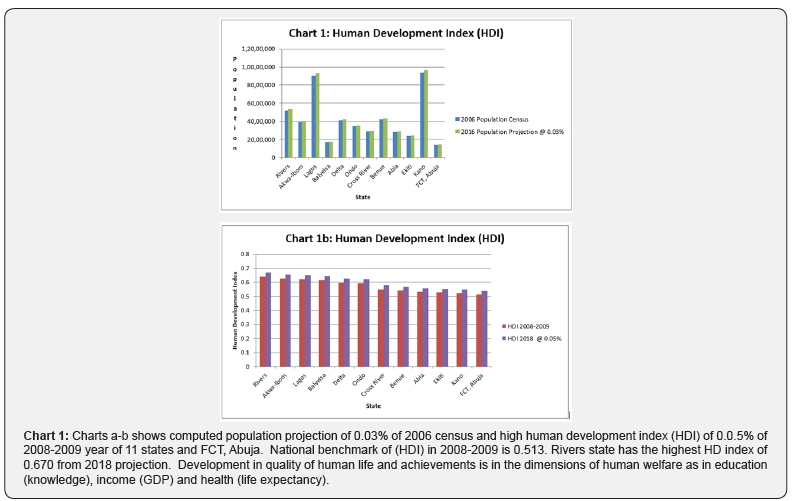
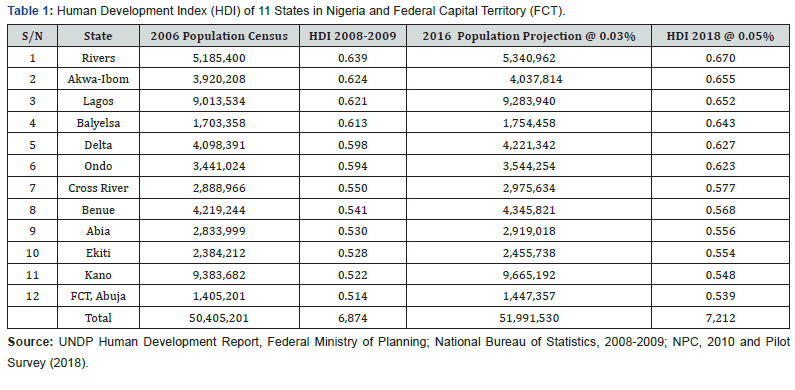
Findings and Discussion
Table 1 shows 2018 projection of 2006 population census at 0.03% and HDI at 0.0.5%, it will be observed that more states as against 11 states including FCT, Abuja in 2008-2009 year would have a higher HDI above National benchmark of 0.513. Increase in number of states on HDI could be in line with the submissions of [11,12,21], that HDI is a function of the drive for quality education, health care and human welfare. These were in submission with findings of Cunningham & Cunningham [30], which revealed that there is need for improvement in quality and achievements in human life in the dimension of education, health care and income and that these variables are essential indices that will help human integration into the environment and for sustainability of the earth resources. Cunningham & Cunningham [29], added that of these three indices of HDI, educational achievement is more essential as its coordinates and enhances improvement in health care and income generation. Furthermore, in line with objectives 1 and 2, findings show that more states have keyed into the concept of environment and sustainable development in Nigeria. Furthermore, it has been established that of the eleven (11) states in Nigeria as shown in Table 1 & chart 1 (Bayelsa, Rivers, Akwa-Ibom, Lagos, Delta, Ondo, Cross River, Benue, Abia, Ekiti and Kano) including FCT, Abuja have high human development index [11]. But this submission is subject to how friendly and accommodating the environment is to sustain economic and social development. Tables 2 & 3 (charts 2 & 3) shows poverty alleviation states and of geo-political zones in Nigeria. From 2018 projection of 2006 population census at 0.03% and PAI at 0.0.5%, it will be observed that more states as against five (5) states including FCT, Abuja will continue to meet with National GDP benchmark of $1,156.82 of 2008-2009 year. Same can be said of poverty alleviation by geo-political zones in Nigeria. Finding shows that (GDP) per capital and purchasing power parity (PPP) US dollars varies with increase in population and level of investments. South-West geo-political zone with the 1st highest human population (27,581,992) in Southern Nigeria has 43.01 poverty indexes while the North-East geo-political zone with the 2nd highest human population (18,971,965) in Northern Nigeria has 72.16 poverty indexes (Table 4) (Chart 4).
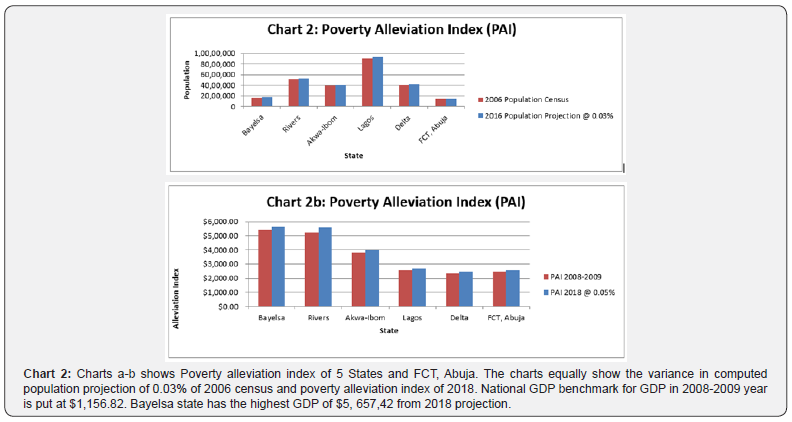

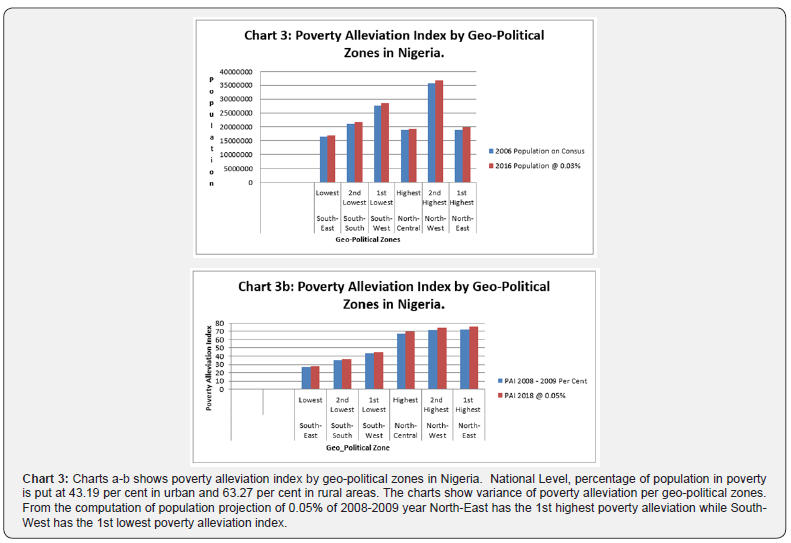
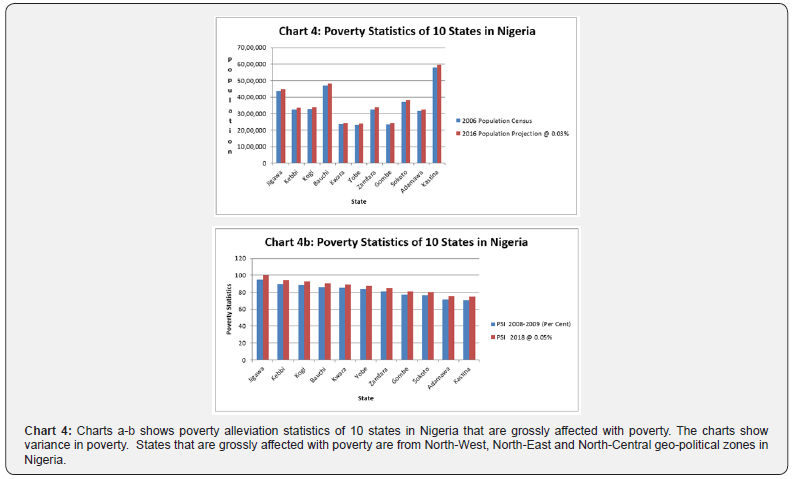

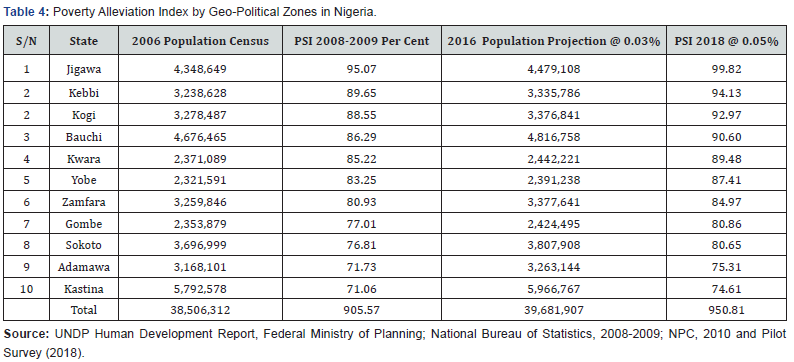
The study further revealed that 10 states (Jigawa, Kebbi, Kogi, Bauchi, Kwara, Yobe, Zamfara, Gombe, Sokoto, Adamawa & Katsina) from North-West, North-East and North-Central geopolitical zones are grossly affected with poverty. In line with objective 3, it shows that governance on trade and investment and empowerment on income generation as key indices of poverty alleviation is low in these states and that leadership role on poverty alleviation is still lows in these states if compared to other states of the Federation. The degrees of poverty in these states could be in line with the submissions of Cunningham & Cunningham [7], as cited by Ivbijaro [2] and Fagbemi & Agbebaku [24], that poverty is measured in both economic and humanitarian index is aimed to lift people out of poverty and less governmental attempts of poverty alleviation in these areas. Furthermore, findings from Ivbijaro [2], shows that 63% of Nigerian lives on less than $1 per day and that about 54.41 per cent of Nigeria population is poor.
Table 5 (Chart 5) shows that from 2018 projection of 2006 population census at 0.03% and HCI at 0.0.5%, it will be observed that more states as against fourteen (14) states including FCT, Abuja will continue to meet with National HCI benchmark of 50 years of 2008-2009 year. Facilities of health care services were mal-administered, effective and not evenly distributed across states and geo-political zones in Nigeria. The study of Howard [25], Farai [11], observed that health care is aimed in addition to improved quality of health care services is concerned about organization of people, institution and resources that deliver health care services. Findings from Adedeji & Eziyi [9], Withgoth & Brennan [15] and Ivbijaro [2], revealed that there in need for distributional equity, adequate provision of social services and governance; participation and accountability. Fourteen (14) states including FCT, Abuja (Ekiti, Cross-River, Borno, Imo, Kano, Kebbi, Kwara, Nasarawa, Ondo, Sokoto, Bauchi, Bayelsa, Delta, Yobe and Abuja) have met the 50 years National bench mark of life expectancy as against 51.9 years at birth rate in Nigeria in 2008-2009 year. In line with objective 3, the study further reveals that there are high values for health care facilities in 15 states as presented in Table 5 than in other states of the federation [11]. Life expectancy in Togo is 56.1 while in Ghana and Benin Republic respectively it is put at 64.2 in 2008-2009 year.
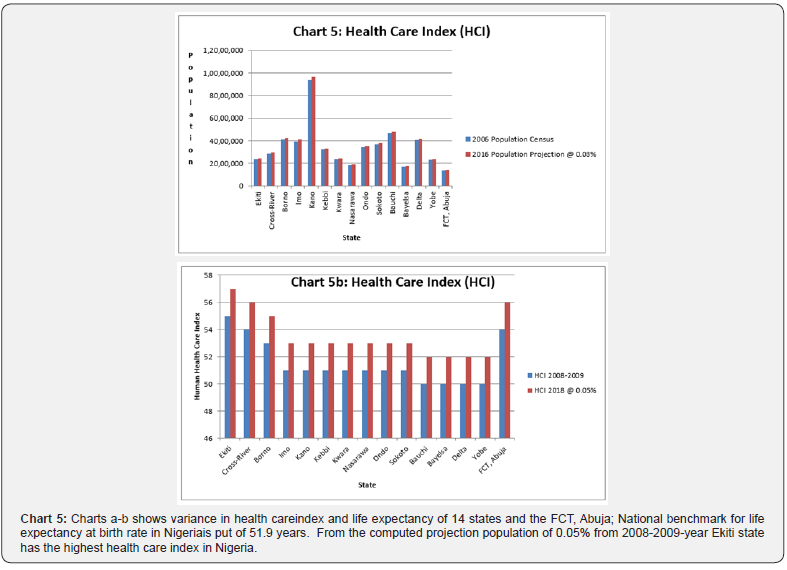
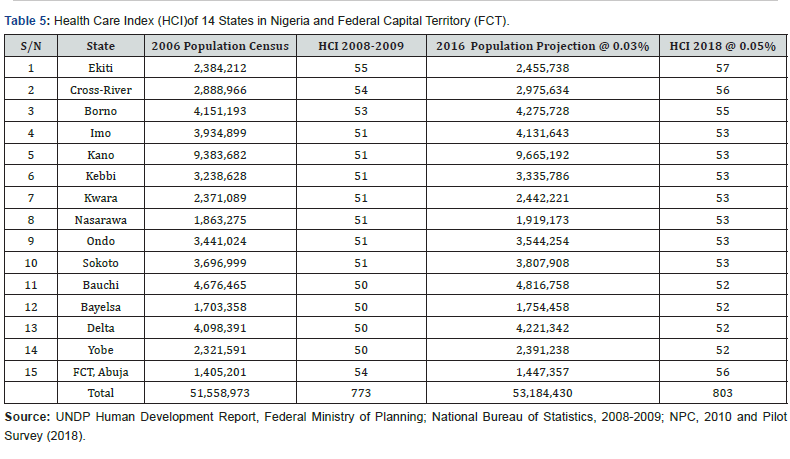
Lastly, from the 2018 projection of 2006 population census at 0.03% and PAI at 0.0.5%, it will be observed that more states as against ten (10) states including FCT, Abuja will continue to meet with National EI benchmark of 0.712 of 2008-2009 year. Findings revealed that educational attainment is higher in three of the geo-political zones than in other zones; South-West, South- East and South-South states. Ten (10) states (Rivers, Akwa-Ibom, Lagos, Anambra, Enugu, Ondo, Imo, Edo, Abia and Ekiti) including the FCT, Abuja met the educational index National benchmark of 0.712. This agrees with the summations of Omofonwan & Segynola [31-39], Adedeji & Eziyi [9] and Wright & Boorse [12], that education depicts knowledge, wealth and leadership. They added that education enhances sustainable development of human development, poverty alleviation and health care among other principles of sustainable development. Furthermore, in line with objective 4, the study revealed that low attainment of educational standard as presented in Table 6 (Chart 6) will lead to low human development [11]. He added that an unmanaged environment will lowered sustainability development of the earth resources, which can be from the indices of human development, economic recession, food scarcity, threat from poor waste management, poor governance and accountability, population explosion and un-coordinated city structure, loss of resources, health challenge and global inequality. Furthermore, from the computation of 2006 population census in 2006 and with a projection at 0.03% in 2016 still on Table 6 revealed that Lagos state has the highest educational index in Nigeria [11].
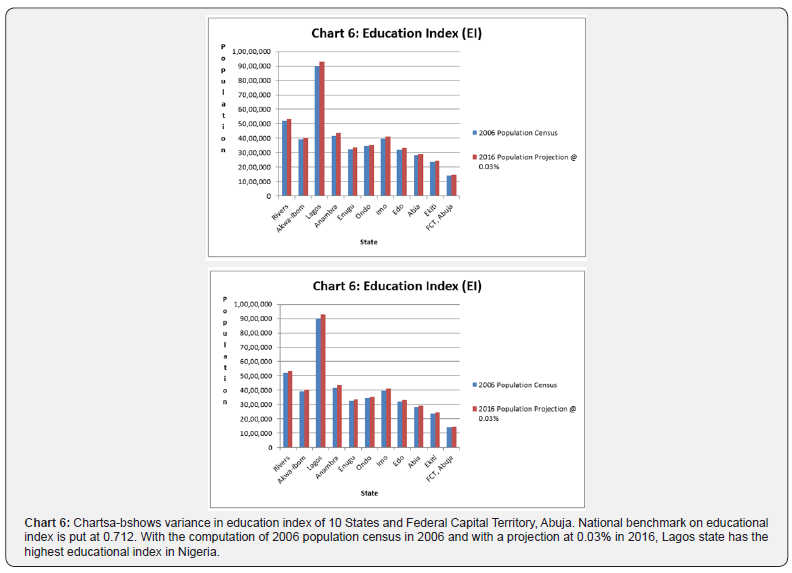
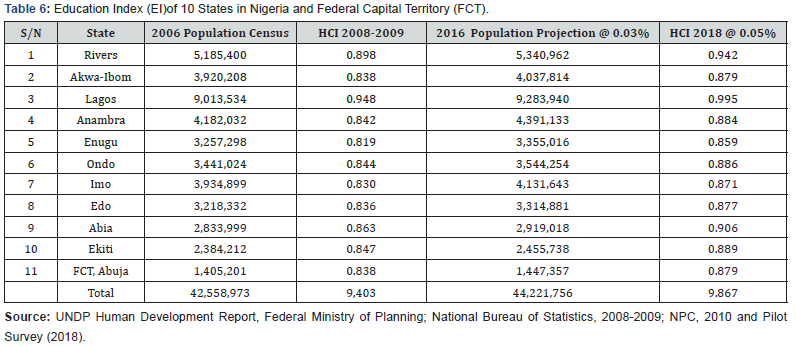
Conclusion
People’s perception, knowledge and attitude toward the environment and sustainable development need to be defined and re-define from time to time. Summits on environment and sustainable development aimed at turning the lofty goals, promises and commitments of varied earth summit’s into concrete and tangible actions, to advance and strengthen the inter-dependent and mutually reinforcing pillars of sustainable development in the sectors of economic, social and environment. There is need for improvement in the drives for knowledge, perception and attitudes of human in the provision of social services, good governance, housing and urban development, environmental impact on conflict, transportation and infrastructures, climate change, agricultural and rural development, combating desertification, drought and deforestation, protecting biodiversity, health care and poverty among others indices of sustainable development in Nigeria.
In order to attain equity distribution of social and economic services, the indices of human development, poverty alleviation, education and health care among others should be sustained. Number of schools, hospitals and other health service outlets, poverty alleviation schemes should be adequately taken care of by the 3-tiers of government. Governance is tied toward development of economic and social sectors of any economy. Development connotes change of character in economic and social sectors of the environment. There is the need to integrate the environment into development of the earth resources. Practice of build-up environment and afforestation brings lives into the ecosystem, while unmanaged environment results to gradual death of man, plants and other organisms of the ecosystem. The cycle(s) of energy in each of the components of the ecosystem, interaction and interrelationship must be maintained and sustained.
References
- Wright R T, Nebel B J (2002)Environmental Studies: Towards a Sustainable Future 8.
- Ivbijaro M F A, Akintola F (2012) Sustainable Environmental Management in Nigeria, 2: 9-37.
- Encyclopaedia Britannica, Vol. 4.
- Adams H (2010) Awake: Our Battered Earth. (January 22, 2000), 3-11.
- Odiette W O (1993) Environmental Impact Assessment for Sustainable Development, 1 Nigeria, 56-80.
- Thomas A E (2009) Classical Edition Sources: Environmental Studies 3(5): 93-107.
- Cunningham W P, Cunningham M A (2012) Environmental Science: A Global Concern, America 12(17).
- Agbebaku, H U (2016) Environmental Degradation in Nigeria, A Ph.D. Seminar Paper Presented to the Department of Geography and Environmental Management, Ambrose Alli University, Ekpoma, Edo State, Nigeria.
- Adedeji D and Eziyi O I (2010) Urban Environmental Problems in Nigeria: Implications for Sustainable Development: Journal of Sustainable Development in Africa. 12(1) Pennsylvania, US.
- Dokun O O P (2008) Sustainable Development: Issues and Challenges for Nigeria Ibadan, Nigeria.
- Farai I (2012) Environmental Radioactivity and Public Health in Nigeria, Edited by Ivbijaro and Akintola in Sustainable Environmental Management in Nigeria, Ibadan, Nigeria 2: 303-315.
- Wright RT, Boorse D F (2011) Environmental Science: Toward a Sustainable Future2016 11(10).
- Omofonmwan S I, Osa-Edoh G I (2008) The Challenges of Environmental Problems in Nigeria: Geography and Planning and Educational Foundation, Ambrose Ali University Ekpoma, Nigeria.
- Sridhar MKC (2012) Waste Management Policy and Implementation in Nigeria, Federal Ministry of Environment, Edited by, Ivbijaro and Akintola, in Sustainable Environmental Management in Nigeria 2, 253-259, Nigeria.
- Withgoth J, Brennan S (2011) Essential Environmental: The Science Behind the Stories, Indonesia 3.
- Agbebaku, H U (2015) Environmental Challenges and Climate Change: Nigeria Experience. Quest Journal of Research in Environmental and Earth Science 2(4): 01-12.
- Adewole A T (2009) Waste Management towards Sustainable Development in Nigeria: A Case Study of Lagos State. International NGO Journal 4(4): 173-179.
- Okon J (2008) Nigeria Newswatch Magazine October 26th 1988.
- Ahove M A N (2001) Environmental Management and Education: An Introduction, Lagos 2.
- Ahove M A N (2001) The Nigeria Environment, Course Material on ESM 102, National Open University of Nigeria, Abuja, Nigeria.
- Agbebaku, H U (2018) A Spatial Analysis of Solid Waste Management and Environmental Quality in Benin Metropolis, Edo State, Nigeria. A Ph.D. Research Proposal Presented to the Department of Geography and Environmental Management, Ambrose Alli University, Ekpoma, Edo State, Nigeria.
- Anifowose R , Enemuo C (1999) Elements of Politics, Lagos.
- Ademolekun L (1983) Public Administration. A Nigerian Comparative Perspective, Lagos, Nigeria.
- Howard A O, Agbebaku H U (2014) Introduction to Public Administration, Course Material on BHM 747, National Open University of Nigeria, Abuja, Nigeria.
- Howard F (2010) Environmental Health from Global to Local, United States of America.
- Ige O (2012) Nigerian Tribune Newspaper 25th May.
- Okechukwu N (2013) The Punch Newspaper, Tuesday November 19th 2013.
- Ayo T (2015) Critical Issues in Environmental Sustainability: Forward by Peter Okebukola, Unesco Consultant on the Environment, Lagos.
- Newsweek International ‘Earth at the Summit’News Week International (June 22, 1992) 40-42.
- Cunningham SJ, Cunningham AM, Saig B (2005) Government Science, A Global Concern, America, 8.
- Omofonmwan S I and Segynola A (2008) Conceptual and Philosophical Framework for Environmental Management and Sustainable Human Development. Environmental Management for Sustainable Human Development, Edo State University (EDSU) Library.
- Ayo T (2014) Environmental Challenges and Climate Change; What You Must Know: Forward by Peter Okebukola, Unesco Consultant on the Environment, Lagos.
- Edet T N, Ukpong A J, Ekwere, A S (2011) Environmental Challenges and Degradation. African Journal of Environmental Science and Technology 5(13): 1152-1169.
- Intergovernmental Panel on Climate Change (2007) Forth Assessment Report on Climate Change.
- Numem L (2009) Introduction to Health Administration in Nigeria, Lagos, Nigeria.
- Okpara I (2011) New Nigerian, Wednesday September 28th, 2011.
- Oseghale P (2011) Waste Management Handling in Benin City, Degree Thesis Industrial Management, West Africa.
- Oworu O (2012) Africa Independence Television News: An Unpublished Article on Environmental Challenges and Degradation in Nigeria: The Way Forward.
- Strahler A, Strahler A (2008) Introducing Physical Geography, America 4.

